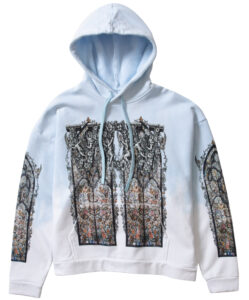In the lineage of American music, there’s always been a place for the outlaws—those who didn’t fit the mold, who sang with scars instead of polish. Today, that mantle is carried not just by gravel-voiced legends or stadium-packing superstars, but by a new generation of wild ones. At the forefront are Jelly Roll and Jessie Murph, two artists from different corners of the country—one a tattooed Nashville survivor, the other a Gen Z powerhouse from Alabama—united by raw storytelling, emotional transparency, and the courage to wear their pain onstage.
In a world still obsessed with perfection, their honesty hits like a brick through glass.
Jelly Roll: Redemption With a Southern Drawl
Jelly Roll didn’t choose the easy road—he survived the hard one. Born Jason DeFord in Antioch, Tennessee, his early years were marked by drug charges, jail time, and the kind of heartbreak that doesn’t fade with fame. But it’s that very past that fuels his music.
With a voice that drips Southern soul and songs like “Save Me,” “Son of a Sinner,” and “Need a Favor,” Jelly Roll merges country grit with gospel, hip-hop, and blues. His lyrics don’t hide the mess—they name it, grieve it, and keep going.
“I make music for the lost, the hurting, the misunderstood,” he once said in an interview. “For the people who cry in their car and then walk into work with a smile.”
What makes Jelly Roll powerful is that he doesn’t chase redemption. He sings from within it, knowing it’s not a destination, but a daily choice. He’s open about addiction, mental health, his struggles with faith and family. That kind of transparency, especially in country music, is still rare—and necessary.
Jessie Murph: Teenage Heartbreak, Adult Soul
If Jelly Roll is the voice of hard-earned wisdom, Jessie Murph is the cry of someone still in the middle of becoming. At just 19, she’s already known for gut-wrenching lyricism and smoky vocals that carry the weight of someone twice her age.
Her breakout tracks—“Always Been You,” “Pray,” and “Cowboys and Angels”—don’t just chart heartbreak. They dissect it. She doesn’t polish her pain. She writes it like a diary left open for anyone to read. And what’s striking is how her fans don’t just like her songs—they live inside them.
Jessie often references mental health struggles, family trauma, and the suffocating expectations of girlhood. In one moment, she’s belting a power ballad. In the next, she’s posting unfiltered thoughts to TikTok, connecting with fans not as an idol but as an equal.
“I’m not perfect,” she said in a 2024 interview. “I don’t want to be. I just want people to feel less alone when they hear my stuff.”
Parallel Stories, Shared Pain
Though Jelly Roll and Jessie Murph come from different generations, genres, and geographies, they share a powerful through-line: emotional honesty as resistance.
Both come from places where pain wasn’t always discussed openly. Both have used music to kick down doors—culturally, spiritually, and personally. They don’t pretend to be fixed. They show up, broken and brave, and let their listeners do the same.
In their voices, there’s rage. Sadness. Resilience. And maybe most of all—recognition.
Country, Rewired
Country music has long been a genre tied to image and tradition. But artists like Jelly Roll and Jessie Murph are reshaping its sound, aesthetic, and emotional vocabulary. They bring hip-hop rhythms, pop production, and unvarnished confession into a space that once prized polish and perfection.
Their influence is shifting the center of gravity. Fans who once didn’t see themselves in country music now show up in droves—queer fans, fans of color, kids raised on SoundCloud rather than Southern radio. And through all of it, these artists remain unapologetically themselves.
They’re not asking for country’s approval. They’re expanding its definition.
The Power of Vulnerability
In a culture obsessed with curated perfection, Jelly Roll and Jessie Murph offer something far more radical: truth.
Truth about relapse. About loneliness. About childhood trauma. About praying for something—anything—to change. They write about mistakes without making them pretty, and that makes their music more than relatable—it makes it revolutionary.
Jessie sings from the edge of emotion, often sounding like she’s about to break down mid-song. Jelly Roll belts from the gut, each lyric scarred with real experience. And both artists lean into that fragility not as weakness, but as power.
A New Kind of Wild
The traditional “wild one” was a rebel without a cause. But Jelly Roll and Jessie Murph are rebels with one—to make music that frees people. To tell stories that dignify pain. To remind us that crying in your car to a song is a kind of communion.
They’re not just making tracks. They’re making space. Space for grief. For confusion. For joy that’s hard-won. For a kind of survival that doesn’t need to be glamorous to be beautiful.
A Tribute, Ongoing
This is for Jelly and Jessie—the artists who don’t flinch.
Who bleed truth over beats. Who cry and curse and pray in the same verse. Who let their mess be medicine for the rest of us. Who prove, over and over, that there’s strength in showing up raw.
They are the wild ones not because they’re untamed—but because they refuse to be tamed by expectation.
And in doing so, they’re not just making hits—they’re making healing possible.
No comments yet.








